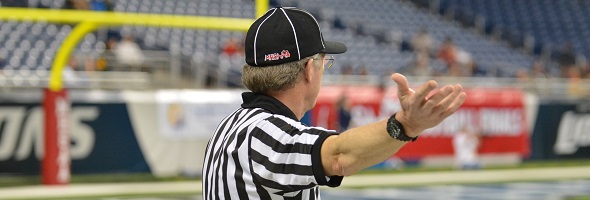
Be the Referee: Concussion Protocol
September 4, 2014
This week, MHSAA assistant director Mark Uyl explains the football official's role in making school personnel aware that an athlete may have sustained a concussion.
"Be the Referee" is designed to help educate people on the rules of different sports, to help them better understand the art of officiating and to recruit officials. The segment can be heard on Mondays, Wednesdays and Fridays during the school year on The Drive With Jack Ebling on WVFN-AM, East Lansing.
Below is this week's segment - Concussions - Listen
Today we are going to talk about concussions. It is important to know that a game official will never make a diagnosis of whether or not an athlete has suffered a concussion. However, those game officials do have an important role to play when it comes to keeping athletes safe.
Officials must be not only aware during the play but especially just after the play for any athlete that appears to be disoriented, unsteady on their feet, or even appears dizzy to where the game must be stopped immediately, the coaching staff notified and then officials need to allow the coaches, working with the school's medical personnel, to make the best decision for the athlete involved.
Past editions
Aug. 25 - Targeting - Listen

Be the Referee: Penalty Kick Change
October 6, 2016
This week, MHSAA assistant director Mark Uyl explains how soccer penalty kick rules have been changed this year to dissuade players from hesitating before taking the kick.
Be The Referee is a series of short messages designed to help educate people on the rules of different sports, to help them better understand the art of officiating, and to recruit officials.
Below is this week's segment – Soccer Penalty Kick Change - Listen
In the game of soccer, goals are tough to come by. That’s why in some of the most important games, we see those contests head into overtime and ultimately get decided by penalty kicks – or P-Ks.
The rules dealing with penalty kicks have changed for this year. In years past, whenever a player would hear the referee’s whistle and start to move toward the ball to make a penalty kick, any hesitation, delay or stutter-step would make that kick illegal. In past years, that player always got an opportunity to take a re-kick.
But this year, there is no opportunity for that player to take an additional re-kick.
Past editions
Sept. 29: Preparation for Officials - Listen
Sept 22: You Make the Call: Returning Kickoffs - Listen
Sept. 15: Concussions - Listen
Sept 8: Equipment Covering the Knees - Listen
Sept. 1: Play Clock Experiment - Listen
Aug. 25: Clipping in the Free Blocking Zone - Listen

